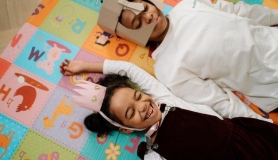AHH, SIBLINGS. THEY bring out the worst in us: I distinctly remember biting my brother in the foot and then accusing him of kicking me in the mouth. But they also bring out the best, like the time a mean kid invited my popular brother to a party and loudly announced that his uncool, bookworm sister couldn’t come along. My brother calmly said that he would not be attending, in that case. Pretty classy for a pesky little brother!
Many siblings, particularly if they are close together in age, spend more time with one another than they do with any other person. This can have profound and long lasting effects on their social development and self esteem. Some adults will tell you their sibling was their friend and sounding board, driving them to achieve and teaching them to deal with confrontation. Others will say their sibling is the only person who can really wind them up! These feelings can continue into adulthood and beyond, long after we think we’re too grown up for bickering.
Siblings fight
Considering how much siblings’ relationships can affect our children, we can see how important it is for us to encourage the best possible relationships. And the first thing we as parents need to know is: Siblings Fight. As frustrating as it is to listen to children accuse one another of ‘breathing at me’ or ‘touching my chair’, it’s not going to be all sweetness and light one hundred percent of the time. And why should it be? The world is full of conflict and emotion, and kids who learn to resolve their differences and deal with anger within a loving environment are equipped to go out and make the world a better place.
If your children already have a mostly good relationship, you’re in luck. They are honing skills with one another, like jumping from a higher step, and perfecting their cutting verbal repartee. They may fight as a result of tiredness, hunger or just because they are spoiling for a fight right now. It’s best not to get involved in figuring out ‘Who Dunnit’, since it will probably blow over and be forgotten. A clever way of helping most children resolve an argument is to say, “You guys are so smart. I know you can come up with a great solution to this problem. Let me know when you do!”
Giving your children responsibility
This hands responsibility for the conflict to the children, while keeping you in the loop. It gives them confidence in their own resolution abilities. And you will be amazed at some of the creative solutions they come up with! At other times, children (like grownups) just need to be apart until hot tempers cool down. Time outs may be used, simply to allow everyone separation and a break from the drama. A snuggle and a snack during this time can do wonders. But think creatively! I always found my boys would band together if I was cross, so I would say “That’s it! Time out!” and put them to sit facing one another in the kitchen. Then I’d stomp off and turn my back. In ten seconds they’d be making ‘cross mummy’ faces at one another and giggling. “I will not have ANY giggling!” I would announce. Which, of course, would reduce them to falling-off-the-chairs fits of laughter.
Setting the stage
From the very first days of a sibling’s life, how parents interact with their older children sets the stage for the future relationship. Talking about how the older sibling was once so tiny, how she loved to sleep just as much, and how you felt about her warm baby smell can help to ease jealousy. Talking about the baby as a real person with feelings helps older siblings to form an empathetic bond with him. ‘I talk to Zara about how I did the same things for her that I do for the baby, so she doesn’t feel that I’m always just doing things for him.’ Theresa, mother of a fiveyear-old and a baby. Using positive words or images which encourage family togetherness is also useful. Talk about how great ‘Our Family’ is. Let the children overhear you saying how much you enjoy being together, or how much fun you all had singing on the way to school. Declare, “Let’s go, Team Smith!” as you head out the door in the morning. Frame photos of the children hugging or playing together, and display them prominently. This can be a daily reminder that a sibling is not always a pest. ‘I always refer to us as a ‘“tribe”.’ Melissa, mother of three boys.
A little soul-searching
In some families, sibling rivalry is not just an occasional setback. It’s an ongoing battle of tale-telling and friction, making daily life miserable for everyone in the household. It can get to the point where every family outing, every trip in the car, every mealtime is unpleasant. Parents say it drives them mad. When this family dynamic is what children draw on to define themselves as individuals, it can be shattering. So how can we turn a negative sibling relationship around? As with many family issues, the solution may lie with the parents. We need to make an active decision to bring some peace to our household, whether our kids are still young or the rivalry has simply escalated in the adolescent years. Stress can cause an upswing in hostility. If a child is being bullied at school, or parents are anxious, or there has been a stressful event which affects the family, children may take their worries out on those closest to them. Rather than just begging the kids to stop the fighting, sit down and have a good think about what may be causing the discord. A little soul searching may be in order. Are we really paying attention to our children? Do our kids say mean things because they have heard us speak about people in that way? Do we lose our tempers easily or tease others? Sometimes it can be a shock to hear our own words or attitudes mirrored by our kids.
A kinder and more positive family life
The first thing to do is sit the family down for a short chat about how you feel about the current situation. Try to help them see that as a family, you are all in this together and you must all work hard to move towards a kinder and more positive family life. Even young children can understand this sentiment. Ask the kids to let you know, kindly, if they hear you being mean, and say that you will do them the same favour. We can teach by example, showing children how to talk about their feelings. We can show empathy to a hurt child when conflict arises, instead of giving all the attention to the aggressor.
With older kids who have learned to control their impulses somewhat, it can be helpful to have specific consequences for actions. With my three boys sharing a room, our house can become a war zone at times. When they know that any violent action will lead to cancellation of all videogame privileges, my boys are more likely to walk away from a battle. Of course, ‘All videogame privileges’ means that no-one is allowed to play, not even the victim. This makes antagonistic little ones stop and think when they can see their sibling is about to boil over. Many kids have a go-to dreadful act to commit against siblings, whether it’s hitting, name calling or some other tendency. Making a definite no-excuses rule against that act can force children to rethink and break a bad habit. I am not usually a fan of creating arbitrary consequences for actions, but if a child is being hurt, it must be stopped.
So many sibling arguments are simply a bid for a parent’s attention. Toddlers may unconsciously decide that thwacking someone on the head is a great success, since they don’t mind what kind of attention they get. Spending more time with them can help. It may be as simple as a one-on-one cuddle and bedtime story, or a planned event like a regular lunch date between one child and a parent.
A learning experience
Some parents try to treat their children exactly the same, hoping to appear fair in their dealings. But equality is not practical. Some kids need more sleep. Some may even have health issues which demand more of your time and energy. Once in frustration I asked my jealous sons, “Do you really think I should treat you all exactly the same?” This made them stop and think, and they replied, “No.” I love to see my children together. They get along well… most of the time. And when they fight, I try to turn the situation into a learning experience for us all. Like most aspects of parenting, encouraging sibling togetherness takes time and thought. Every family is different, which makes problem solving challenging. But it’s also what makes siblings so important. Who else in the world would understand where you get your quirks from?
Nan Sheppard is a Breastfeeding Counsellor and Parenting Specialist (her kids think this is hilarious) with seven years’ experience teaching parenting skills to at-risk teens in Trinidad and Tobago. She now lives and writes in the UK.
WANT TO KNOW MORE? ahaparenting.com askdrsears.com thingsivefoundinpockets.com







